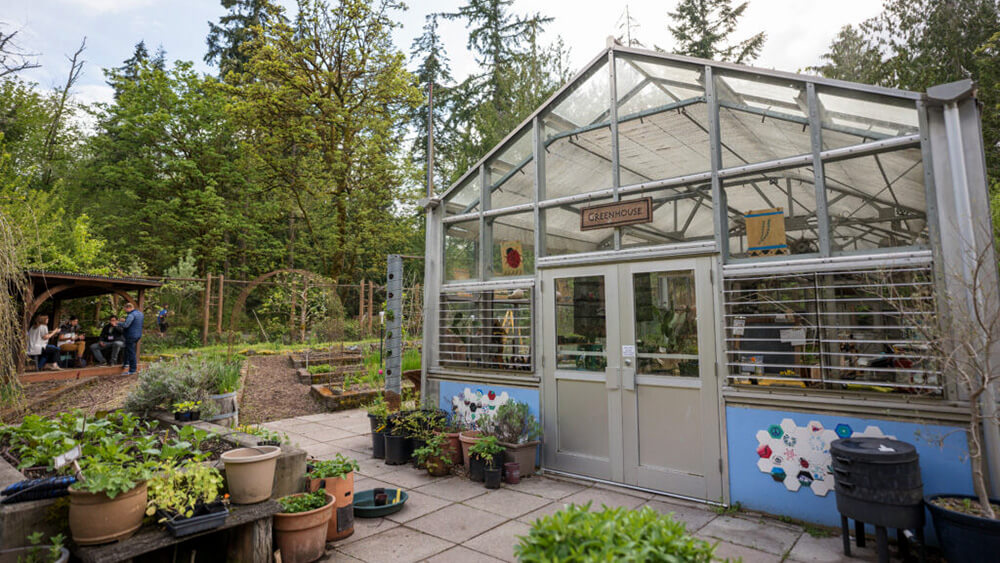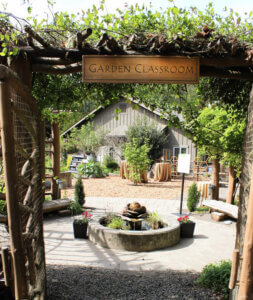
IslandWood is an environmental nonprofit on Bainbridge Island in Washington state that hosts residential educational programs for young students as well as corporate meetings and retreats.
When I first encountered Wade — a tall, metallic, balancing figure holding a large pail in one outstretched arm and a counterweight in the other — in the dining room at IslandWood, an environmental nonprofit on Bainbridge Island in Washington state, it took me a minute or two to get the joke behind his name. Wade stood on a scale and, beginning with the first meal served to the young students and campers who participated in IslandWood’s residential educational programs, Wade weighed the food waste that diners scraped off their plates. Over the remainder of a group’s stay at the 250-acre reserve and educational center, IslandWood staffers display a running tally of the weight of the food collected and measured after meals.

Wade, a scale in the dining room of IslandWood, weighs the amount of food waste scraped from diners’ plates.
The point of the exercise is to get young visitors to work together to reduce the food waste they generate, and according to staff and visitors, the results are overwhelmingly positive. Writer Julia Moris-Hartley, a teacher who accompanied students who were part of a group of 200 middle-school students who stayed for a few days at IslandWood, reported on her eaterprovocateur blog that the entire group wasted about 10 pounds of food and liquids during their first meal, but reduced the amount by 80 percent, to two pounds over the course of a short visit. Other groups have been able to reduce the amount of food wasted from 20 pounds to zero.
Wade’s measurable success illustrates the power of social influence to motivate behavior change, a finding that has emerged in multiple studies conducted by global behavioral scientists: Leveraging the influence of those around us — termed “social comparison” by researchers — is a more effective way at moving people to take actions that can mitigate climate change than providing information. In fact, in a study published in the Proceedings of the National Academy of Sciences, 2023, which pooled the results of 430 global studies and compared six different methods used to try to change behavior around climate change, education was ranked the least effective method, followed by giving individuals feedback about their own past behavior. And in spite of the proliferation of pledges to cut carbon emissions and to take other actions to mitigate climate change, making such commitments, in public or in person, was also less effective, according to the research, than straightforward appeals for change. The two most successful ways to motivate change were by offering financial incentives and, at the top of the list, social comparison. According to the research, education and other methods used to motivate behavior change were useful, just less so than social influence.
There have been previous studies that show the same effect, including a 2008 case study in the Journal of Consumer Research, where a placard left in a hotel room telling guests that most of the hotel’s guests reuse their towels was 25 percent more effective in convincing guests to reuse towels than a placard that offered information on the practice’s energy-saving benefits. And when utility customers receive information about how their energy consumption compares with their neighbors, their electricity use declines by a few percentage points, according to research published by the National Bureau of Economic Research.

Attendees of corporate meetings and retreats at IslandWood have participated in special events harvesting food from the center’s garden (above) and greenhouse (top photo).
In all cases, it was the impact of others that influenced behavior — a factor that makes events an ideal place for actions like reducing food waste and finding alternatives to single-use plastics to take root and spread. Magnus Bergquist, a senior lecturer in the psychology department at Sweden’s University of Gothenburg, and one of the lead authors of the analysis of motivation and behavior published by the National Academy of Sciences, reported that leveraging social comparison worked best on a smaller scale — less than 9,000 people. “One explanation for this may be that small-scale studies are more often based on direct techniques such as face-to-face interactions, which have a greater chance of influencing behavior,” Bergquist told ScienceDaily.
IslandWood is a 35-minute ferry ride across the Puget Sound from Seattle, and its meeting spaces and sleeping lodges make it a popular venue for corporate meetings and retreats, said Rachel Samuelian, the nonprofit’s director of communications and marketing. Adult visitors aren’t asked to scrape their food waste into a pail, Samuelian said, but have participated in special events harvesting food from the center’s garden and greenhouse and tours that highlight the nonprofit’s environmental mission and impact. “So many groups choose us not only because of our natural beauty,” Samuelian said, “but because they are people who think about their choices. It sows a seed in the event guests’ minds.”
Barbara Palmer is deputy editor of Convene.
